|
Contents
Rural and Statewide Connectivity
The Texas Department of Transportation continues to work toward a better understanding of the importance of the transportation system. In just the past year, the Ports-to-Plains Corridor Interstate Feasibility Study, the Texas-Mexico Border Transportation Master Plan and the Permian Basin Freight and Energy Sector Transportation Plan gathered important data describing the importance of connectivity within the state of Texas and within the Ports-to-Plains region in Texas.
The results of that work were presented to the Texas Transportation Commission on January 27, 2021 by Caroline Mays, Director, Freight, Trade and Connectivity Section, TxDOT.
The Ports-to-Plains Corridor was highlighted in two slides during the presentation. The first provided a review of the economic findings from the Ports-to-Plains Interstate Feasibility Study.
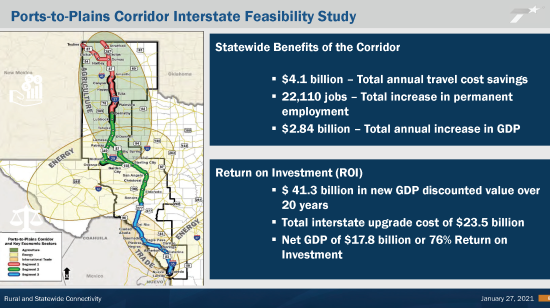
The second was from the Texas-Mexico Border Transportation Master Plan showing the Ports-to-Plains Corridor as part of the Texas gateway for U.S. Mexico trade.
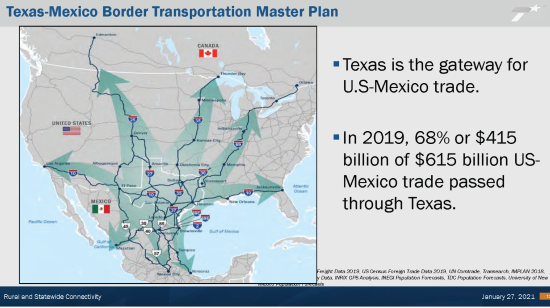
The next slide below shows the value of:
- Agriculture Production
- Generates approximately $34.9 billion a year in sales statewide and $12.6 billion in GSP.
- Energy Production
- In April 2020 Permian Basin accounted for 39% of U.S. crude oil production and $9 billion in state taxes in royalties
- In 2016, the Eagle Ford Shale contributed $3.1 billion in state and local taxes and revenues.
- Timber and Lumber Production
- In 2017, lumber industry contributed $33.6 billion to the Texas economy, including $8.6 billion in income to 166,071 workers.
- International Border Trade
- In 2019, supported 68% of U.S.-Mexico cross-border trade or $415 billion of total $615 billion U.S./Mexico trade.
- International Maritime Trade
- In 2019, Texas ports accounted for an average of 242.7 billion in trade value annually or $131.8 billion in exports and $110.9 billion in imports.
- National Defense and Security
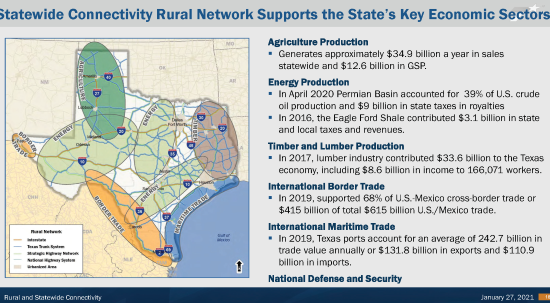
Texas is made up of eleven Rural TxDOT Districts including Abilene, Amarillo, Odessa, and San Angelo; nine Urban TxDOT Districts including Laredo and Lubbock; and five TxDOT Metro Districts. The value of rural areas was summarized in the presentations.
Rural TxDOT Districts provided 71 percent of oil production (1.3 billion bbls), 57 percent of natural gas production (5.9 billion MCF), and 65% of wind energy production (19,113 megawatts). In terms of agriculture production rural districts provided 38 percent of crop sales ($2.5 billion), 56% of cattle sales (5.8 million head), and 60 percent of animal sales ($10.6 billion). Metro districts such as Lubbock and Laredo contributed even more value in energy and agriculture production.
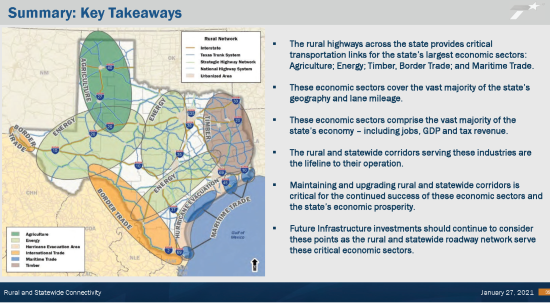
The Key Takeaways summarized:
- The rural highways across the state provides critical transportation links for the state’s largest economic sectors: Agriculture; Energy; Timber, Border Trade; and Maritime Trade.
- These economic sectors cover the vast majority of the state’s geography and lane mileage.
- These economic sectors comprise the vast majority of the state’s economy – including jobs, GDP and tax revenue.
- The rural and statewide corridors serving these industries are the lifeline to their operation.
- Maintaining and upgrading rural and statewide corridors is critical for the continued success of these economic sectors and the state’s economic prosperity.
- Future Infrastructure investments should continue to consider these points as the rural and statewide roadway network serving these critical economic sectors.
Download Complete Rural and Statewide Connectivity Report (pdf-11.35 MB)
Return to contents
The Importance of Highways to U.S. Agriculture
Report was published in December, 2020 by Agricultural Marketing Service, U.S. Department of Agriculture in conjunction with the U.S. Department of Transportation.
Download Full Report (pdf-16.3 MB)
Download Executive Summary (pdf-12.83 MB)
Agricultural commodities are among the nation’s largest and most important exports. The agriculture industry is the largest user of highway freight, and the industry relies on highway infrastructure for the safe and efficient transportation of goods. This report offers insights to inform the transportation planning and project selection processes that build and maintain highway infrastructure used by the agriculture industry.
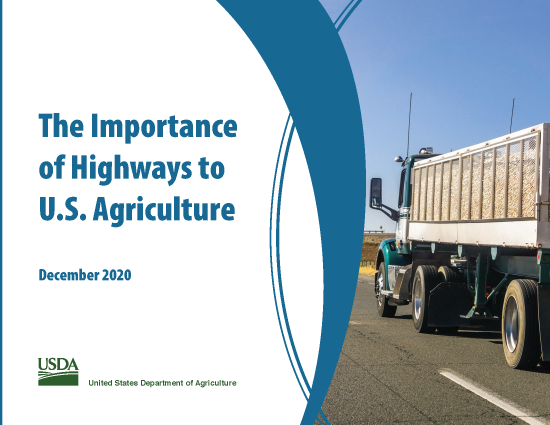
Highlights of Research Findings:
- 80% of domestic agricultural highway freight volume moves on 17% of highway mileage.
- State-planned highway freight investments are estimated to produce $540 million per year in truck operating cost savings.
- Increased highway infrastructure investment, at a level 2-4 times current State Freight Plan investment levels, is modeled to be highly cost-effective (Benefit/Cost Ratio >2.0).
Trucks are an important part of almost every agricultural freight journey.
Trucks may move agricultural goods for an entire journey, through several intermediary steps, or as a part of a multimodal trip that includes rail or barge segments.
- $3.1 Trillion - Annual value of agricultural freight moved across all modes in the United States in 2018.
- 4.5 Billion - Annual tonnage of agricultural freight moved across all modes in the United States in 2018.
- 27 percent - Agriculture industry’s share of all freight ton-miles moved.
- 16 percent - Agriculture industry’s share of all freight by market value.
- 23 percent - Projected increase in total freight volumes over the next 20 years.
- 83 percent - Percentage of all agricultural freight tonnage moved via the highway system in 2018.
- 56 percent - Share of agricultural freight ton-miles moved by truck in 2018.
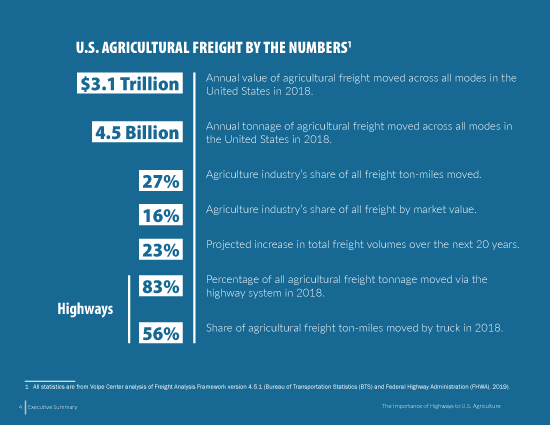
Return to contents
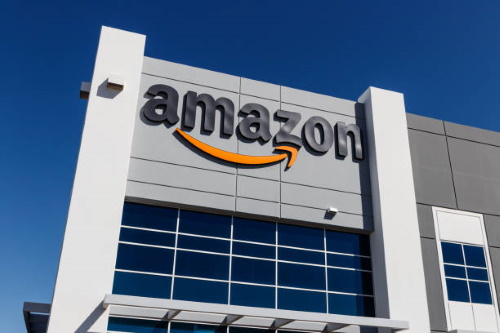
From Lubbock Economic Development Alliance

Amazon Announces New Sortation Center and Delivery Station in Lubbock
Amazon plans to open a new sort center and delivery station in Lubbock, TX. The new facilities are expected to create hundreds of new full- and part-time jobs with industry leading pay and benefits starting on day one.
“We are excited to establish Amazon operations in Lubbock with a new sort center and delivery station that will provide fast and efficient delivery for customers, and provide hundreds of job opportunities for the talented local workforce,” said Jessica Breaux, Manager of Economic Development at Amazon. “We’re grateful for the strong partnerships we’ve made with state and local officials and we look forward to our future in this great city.”
The sort center will employ hundreds of associates who will sort packages before being transferred to a delivery station or last-mile delivery partner for final delivery for customers. It’s the company’s first sort center in Lubbock.
The delivery station will create more than 100 new full- and part-time jobs and will continue to power Amazon’s last-mile delivery capabilities to speed up deliveries for customers in Lubbock.
“Lubbock welcomes Amazon as our city’s newest corporate citizen,” said Lubbock City Mayor Dan Pope. “Amazon’s investment and these new jobs create tremendous economic benefits and employment opportunities for our citizens and for residents throughout the region. Amazon’s announcement is an acknowledgment of the quality of our workforce and it further underscores the strength of our economy.”
On top of Amazon’s industry-leading minimum $15 per hour wage, the company offers full-time employees comprehensive benefits including full medical, vision, and dental insurance as well as a 401(k) with 50 percent match starting on day one. Amazon prioritizes the safety and health of its employees and has invested millions of dollars to provide a safe workplace. The company also offers up to 20 weeks of maternal and parental paid leave and innovative benefits such as Leave Share and Ramp Back, which give new parents flexibility to support their growing families.
“Today’s announcement is a big win for the Lubbock community,” said John Osborne, president and CEO of the Lubbock Economic Development Alliance. “These new facilities will bring a significant number of high-paying jobs and needed employment to our citizens. With a skilled and diverse workforce as well as access to five major highways, Lubbock is well-positioned as a driving force for distribution throughout Texas and the central United States.”
Amazon leverages its scale to help support local communities. Amazon has also pledged to invest over $700 million to provide upskilling training for 100,000 U.S. employees for in-demand jobs. The programs will help Amazon team members from all backgrounds access training to move into highly skilled roles across the company’s corporate offices, tech hubs, fulfillment centers, retail stores, and transportation network, or pursue career paths outside of Amazon.
Amazon in Texas:
- Since 2010, Amazon has created more than 70,000 jobs in Texas and invested more than $16.9 billion across the state, including infrastructure and compensation to its employees.
- Amazon’s investments have contributed more than $18.8 billion in GDP to the Texas economy and have helped create over 49,000 indirect jobs on top of Amazon’s direct hires – from jobs in construction and logistics to professional services.
More than 116,000 independent authors and small and medium businesses in Texas are selling to customers in Amazon’s store, creating thousands of additional jobs across the state.
Return to contents
Rural Infrastructure Coalition Sends Priorities to Biden Administration
WASHINGTON, D.C. – The Rebuild Rural Coalition, which collectively represents U.S. agricultural producers, rural businesses, rural communities and rural families, sent a letter today urging President Joe Biden and his administration to address the unique needs of rural infrastructure in all related legislative proposals.
From the letter: “Your plan to Build Back Better in Rural America rightly notes the crumbling state of our country’s infrastructure. We have witnessed this deterioration first-hand – how it jeopardizes jobs, our agricultural competitiveness and the health of rural families. As you are aware, past infrastructure initiatives often focused on urban and suburban infrastructure, while not adequately addressing the unique needs of rural communities. We ask that you address this as part of your administration’s comprehensive infrastructure renewal efforts.
“American agriculture truly feeds the world and creates millions of jobs for U.S. workers. Our nation’s ability to produce food and fiber and transport it efficiently across the globe is a critical factor in U.S. competitiveness internationally. Infrastructure that supports rural communities and links them to global markets has helped make the U.S. the unquestioned leader in agricultural production. Our deteriorating infrastructure threatens that leadership position.
“Transportation infrastructure improvement is the most obvious need in rural communities, but not the only one. In particular, we appreciate your plan specifically includes roads and bridges, locks and dams, railroads, electrical and water systems, agricultural research at land grant universities, broadband, healthcare and housing.”
The #RebuildRural Coalition is comprised of more than 250 organizations representing U.S. agricultural producers, rural businesses, rural communities and rural families. The Ports-to-Plains Alliance is a member of RebuildRural Coalition.
Download the Letter to President Biden
Return to contents
Check out the newest Ports-to-Plains Video!
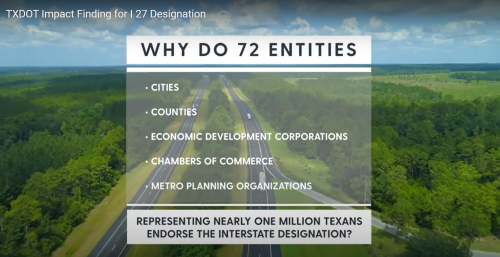
Click to View This Video
Return to contents
|